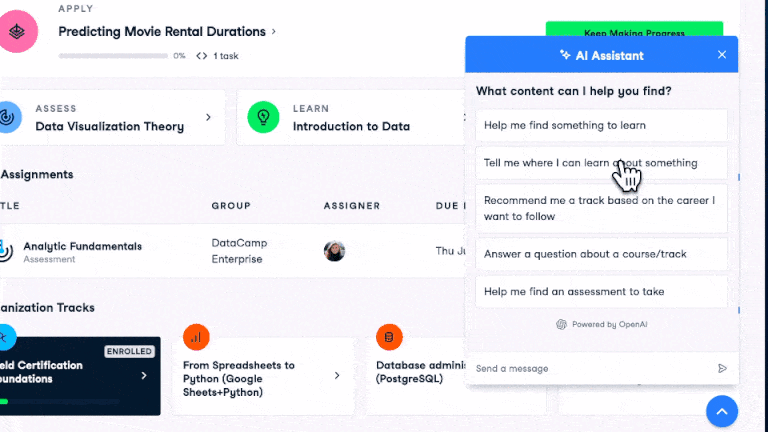Choosing the right platform for AI learning depends on your goals, how you like to learn, and the level of structure you want. In this guide, we compare DataCamp and DeepLearning.AI across costs, curriculum, learning style, certifications, and enterprise options so you can decide which fits your needs.
DataCamp vs DeepLearning.AI: TL;DR
Both platforms teach modern AI skills, but they serve different purposes.
- DataCamp is a complete learning platform for data and AI. You get interactive, in-browser courses, projects, practice, and certifications, plus DataLab, an AI-enabled notebook that lets you analyze data and “chat with your data” in minutes. This works for beginners through advanced professionals, and for teams at scale.
- DeepLearning.AI is a content provider created by Andrew Ng. It offers short courses on AI topics like LLMs, agents, and RAG, and some larger programs. Short courses are often brief and have some embedded code examples.
Quick advice: Choose DataCamp for an end-to-end path in data and AI with hands-on practice, built-in tooling, and certifications. Choose DeepLearning.AI if you want to explore niche AI tools or concepts as a complement to a broader, hands-on learning program.
DataCamp Cost vs DeepLearning.AI
|
Category |
DataCamp |
DeepLearning.AI |
|
Free access |
Short course videos are available free, but the quizzes and hands-on, skill-building elements need a subscription. |
|
|
Individual plans |
Premium subscription prices start from $14/month for individuals when billed annually. $43/month otherwise. |
Pro membership $30 monthly or $300 annually ($25/month) |
DataCamp vs DeepLearning.AI Curriculum Focus
DataCamp specializes in AI and data across areas including Python, R, SQL, BI tools, and applied machine learning. They also focus on emerging technologies in AI, such as LangChain, OpenAI, Hugging Face, and more. The catalog includes skill and career tracks, projects, assessments, and certifications. DataLab adds an AI-enabled notebook that connects to files, Google Sheets, and databases to accelerate analysis.
The curriculum very much emphasizes applied learning. As well as practical and hands-on exercises in courses, there are also projects, skill assessments, webinars, code-alongs, and a workspace to practice with real data, ensuring you move from theory to execution.
In short, the DataCamp curriculum emphasizes:
- Hands-on learning in AI, machine learning, and languages such as Python, SQL, R, and BI tools like Power BI and Tableau.
- Fast-updating content aligned with modern AI tools and workflows such as OpenAI, LangChain, LlamaIndex, and more.
- Partnerships with major players in the market, including Microsoft, Replit, Hugging Face, and more.
DeepLearning.AI has a concentrated AI curriculum with two main formats: short, bite-sized courses on topics like prompt engineering, LangChain, LlamaIndex, RAG, and agents, and longer programs. Their short courses are practical and often tool-specific.
Bottom line: DataCamp offers depth across the full data and AI stack with continuous practice and platform tooling. DeepLearning.AI has a variety of short-form, niche topics.
AI Upskilling for Beginners
DataCamp vs DeepLearning.AI Learning Style and Hands-On Experience
DataCamp’s standout feature is its interactive and engaging learning environment. In many DataCamp courses, you will be hands-on with creating code, solving problems, and getting instant feedback on your answers. The AI assistant can help you find the right solution based on your specific answer to a question.
DataCamp also offers access to DataLab, a data notebook with built-in AI, which means you can get support on your projects, no matter whether you’re a beginner or advanced practitioner.
As well as practical exercises, you can learn through video lessons, guided code-alongs, written tutorials, or hands-on projects. DataCamp helps you learn in a way that fits your life, and turns your new knowledge into real skills. For enterprise customers, you can even get custom learning paths and tailored live training and professional services.
DeepLearning.AI offers short courses that are video-first with some embedded code examples and labs, often in hosted notebooks or Colab. Many can be completed in under an hour or two. They also offer larger specializations with Coursera that combine videos, quizzes, and programming assignments.
Takeaway: If you value a single environment for learning, practice, and portfolio building, DataCamp’s platform is more unified.
DataCamp vs DeepLearning.AI Time Commitment
DataCamp offers bite-sized learning. Courses fit into reasonably short time blocks, often taking a few hours to complete. Longer skill and career tracks can take weeks or months based on your pace, but all of DataCamp’s learning is self-paced, meaning you can find a cadence that works for you. There are also Certifications, which have tracks to help you prepare, and then a defined completion window once you register.
DeepLearning.AI’s short courses are compact, typically measured in minutes to a few hours. For example, some list runtimes of under an hour. That being said, there are also longer specializations, similar to DataCamp’s skill and career tracks, that run much longer. For example, the Machine Learning Specialization is about 94 hours, comparable to DataCamp’s Machine Learning Scientist in Python, which is around 85 hours.
DataCamp vs DeepLearning.AI: AI and Data Specializations
DataCamp is purpose-built for data and AI skills across all levels. You can progress from the fundamentals of machine learning, prompt engineering, and generative AI to more advanced topics, like fine-tuning LLMs, RAG implementation, and developing agentic AI workflows. You can then apply your skills in DataLab with AI assistance and iterate on your ideas.
DataCamp has several prominent partnerships with big players in the industry, including Hugging Face, LlamaIndex, and more. The breadth of content covers modern workflows like working with the OpenAI API as well as more traditional, practical analytics with Python and SQL.
DeepLearning.AI also has a focus on modern AI, especially LLMs and agents. Like DataCamp, some signature courses include Prompt Engineering for Developers and other short courses on agentic workflows, LangChain, LlamaIndex, and RAG. These are kept current and aligned to real tools.
DataCamp Certifications vs DeepLearning.AI
DataCamp offers several Industry-recognized certifications, all of which are included with a Premium subscription. There are both career (AI engineer, data analyst, data scientist) and technology (SQL, Power BI, Tableau, Azure, Alteryx, Python, AWS, and KNIME) certifications, which are valid for two years.
Many of these have been developed in partnership with experts in their fields, meaning that you can master critical skills designed by leaders in data and AI education.
DeepLearning.AI doesn’t offer certifications in the same way as DataCamp. The short courses issue completion certificates, but these aren’t accredited in the same way as DataCamp.
Earn a Top AI Certification
DataCamp vs DeepLearning.AI: Which to Choose?
- Choose DataCamp if you want a complete, hands-on environment for data and AI. You get structured learning paths on the latest AI and data tools, constant practice, certificates and certifications, and an AI-enabled notebook that lets you apply your skills on real data without extra setup. This works for beginners and advanced users, and it scales for teams.
- Choose DeepLearning.AI if you want short courses to explore niche AI tools or concepts as a complement to a broader, hands-on learning program.
Bottom line: For most professionals building or advancing data and AI capability, DataCamp provides a more complete, interactive, and scalable pathway from learning to doing.

A senior editor in the AI and edtech space. Committed to exploring data and AI trends.

